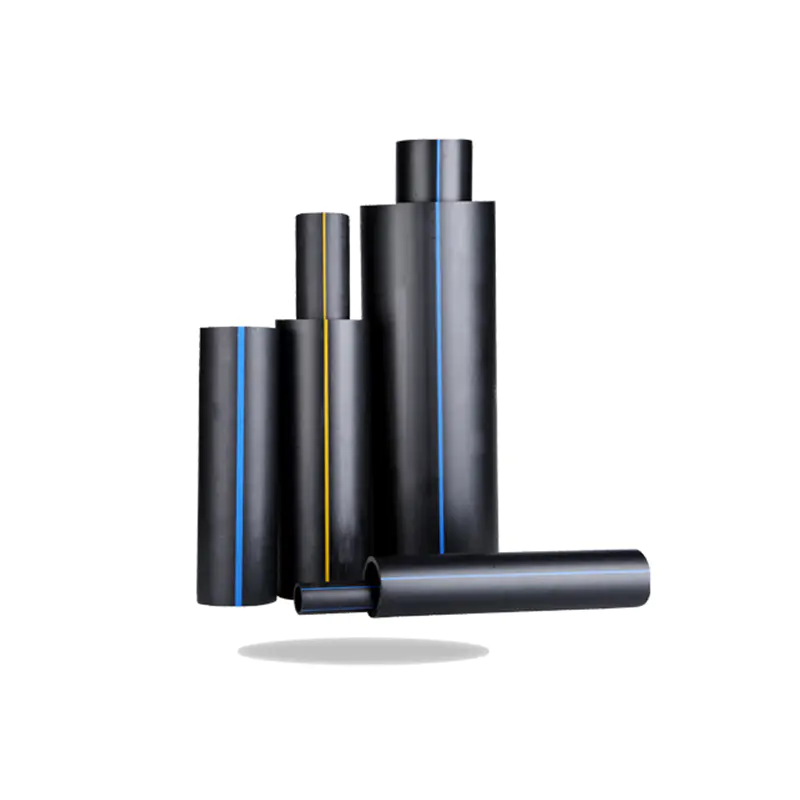HDPE pipes are widely used in water treatment, chemical industry, wastewater treatment and other fields due to their excellent corrosion resistance and chemical resistance. The corrosion resistance and chemical resistance of HDPE pipes directly affect its service life in harsh environments, allowing it to maintain structural integrity and functional stability when in contact with corrosive chemicals, moisture or acidic and alkaline soils. The following are the main aspects of how the corrosion and chemical resistance of HDPE pipes improves their service life in different environments:
HDPE pipes have a tight molecular structure and do not contain polar functional groups, so they will not corrode in humid or acidic and alkaline soil environments. Traditional metal pipelines are prone to chemical reactions when in contact with water, acid, alkali and other media, causing corrosion on the metal surface and gradually weakening the pressure-bearing capacity of the pipeline. In comparison, the corrosion resistance of HDPE pipes allows them to have a longer service life in harsh environments such as underground laying and industrial wastewater discharge, reducing the need for replacement or repair due to corrosion and significantly reducing maintenance costs.
HDPE materials are resistant to a variety of chemicals, including common acids, alkalis, and organic solvents. This characteristic makes HDPE pipes particularly suitable for use in chemical industry, sewage treatment, agricultural irrigation and other fields, and can effectively deal with media containing corrosive chemical components. The chemical resistance of HDPE pipes not only avoids the risk of corrosion or degradation of pipe materials, but also ensures that there will be no accumulation of sediment or impurities on the inner wall of the pipe, ensuring fluid transportation efficiency. These factors work together to reduce safety hazards such as pipeline leakage and bursting caused by chemical corrosion, and extend the overall life of the pipeline.

HDPE pipes also have strong resistance to biocorrosion, making it difficult for bacteria and microorganisms to grow and reproduce on their surfaces. Compared with some metal pipes, HDPE materials are less prone to biological adhesion and avoid biocorrosion caused by microorganisms. Especially in sewage treatment and agricultural irrigation systems containing organic matter, the anti-biocorrosion properties of HDPE pipes are particularly important. This makes HDPE pipes more suitable for long-term use in environments containing biological activity, extending the trouble-free service life of the pipes.
HDPE pipes excel at resisting chemical and environmental stress cracking. When exposed to corrosive environments on the surface or underground for a long time, HDPE pipes can withstand repeated mechanical stress and temperature changes to avoid leakage due to stress cracking. Due to the material's ability to resist stress cracking, HDPE pipes remain stable in environments with large changes in temperature and pressure, reducing the frequency of maintenance and replacement caused by stress cracking and improving the reliability and durability of the pipes.
Due to the corrosion and chemical resistance of HDPE pipes, the pipeline system requires almost no maintenance or regular replacement of anti-corrosion coatings in daily operation, which significantly reduces usage costs. The low maintenance requirements of HDPE pipes reduce additional downtime and maintenance costs compared to metal pipes that are susceptible to corrosion. This makes its cost-effectiveness in long-term applications more obvious, and also further improves the economics of HDPE pipes in application scenarios.
Many actual cases show that the service life of HDPE pipes in harsh environments can reach more than 50 years. For example, in some sewage treatment systems, HDPE pipes perform well in highly acidic and corrosive wastewater environments and maintain good performance after decades of use. In similar chemical transportation applications, HDPE pipelines avoid material degradation caused by corrosion and maintain a long service life. These cases not only prove the advantages of HDPE pipes in corrosion resistance and chemical resistance, but also provide data support for their application in corrosive environments.
The chemical resistance and corrosion resistance of HDPE pipes not only extend their service life, but also reduce the generation of waste pipes, making them more environmentally friendly. With the advancement of material technology, further improving the corrosion resistance and material strength of HDPE pipes can further extend their lifespan and reduce resource waste, meeting the requirements of sustainable development. Therefore, the widespread use of HDPE pipes not only brings convenience in industrial applications, but also promotes environmental protection and sustainable development.
The corrosion and chemical resistance of HDPE pipes play an important role in its service life, allowing it to perform well in a variety of harsh environments. Its properties of resistance to corrosion, chemicals, environmental stress cracking and low maintenance requirements combine to extend service life and significantly reduce maintenance costs. In the future, with the improvement of materials, the durability and environmental protection of HDPE pipes will be further improved, showing their lasting economic and environmental benefits in more fields.

 简体中文
简体中文 English
English русский
русский Español
Español Français
Français عربى
عربى Português
Português












